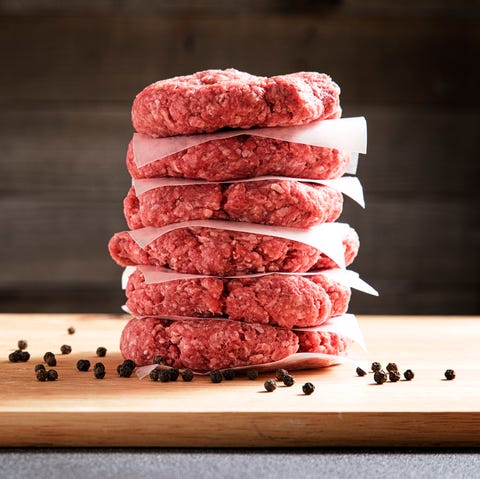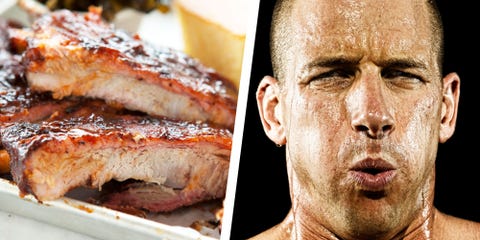
It’s the stuff of legend: You take an overambitious trip to Fogo de Chão where you successfully mow down three skewers of fired meat. You’d sit well with your pride and full stomach if you weren’t sweating like you’d just hit your PB in a late-June 5K. All that meat can’t possibly be making you sweat. Can it? Meat sweats aren’t actually real. Are they? Science says yes.
“Meat sweats are a physical reaction some people can experience after eating large quantities of protein-rich foods,” says Verona Somarriba, MS, RDN, Clinical Nutrition Coordinator for the Division of General Surgery at the Icahn School of Medicine at Mount Sinai.
What’s behind those meat sweats?
There are several things going on in your body that are causing that protein perspiration.
“It’s a cascade effect of multiple systems being activated in the body that lead to the excessive sweating,” says Somarriba. “Eating is a complex process that engages the brain, the mouth, salivary glands, the esophagus, digestive tract muscles, stomach, pancreas, gall bladder, and the liver. This process requires energy, and the type of food that is ingested determines how much energy the body will use to break it down—this is called thermogenesis.”
Getty
Alcohol and protein require more energy to be metabolized than other food items, because of the metabolic pathways the body uses to absorb them.
“Eating large quantities of protein increases body temperature because the body needs to work a lot harder to break it down than vegetables, fruit, fats, or grains, which may unfortunately lead to excess sweating.
“Think of it as running against the wind, the body needs to work harder to push through the resistance,” says Somarriba.
Timing is also a factor when it comes to dietary diaphoresis.
“Meat sweats will happen for some immediately after eating, while others may feel the effects later on and wake up drenched in sweat in the middle of the night. The less often these meals are eaten, the higher the chances of experiencing this abnormal hypermetabolic spike,” says Somarriba. “All of these factors depend on the person’s conditioning, body weight, eating habits (frequency of these types of meals) and other health factors.”
Getty ImagesKoldunov
How can I prevent meat sweats?
There are a few ways you can avoid meat sweats:
1) Mind how much meat you’re eating
“Limit meat portion sizes to 8 oz or less per meal,” says Somarriba. “And try to balance the meal with vegetables, whole grains, and healthy fats to increase satiety.” (Men’s Health recommends that men get 6 to 8 palm-sized portions of protein rich foods per day, which works out to around 30 grams per meal.)
2) Space out your servings
If you’re still hungry, try to space out your next serving to give your body time to digest.
“Wait 2-3 hours before having another plate of food instead of eating a larger portion in one sitting.
3) Skip the booze
And if you know you’re having a large meal, stick with water.
“Avoid having alcohol and large quantities of meat together, which increase the thermogenic effect of the meal,” says Somarriba.
4) Work out more
“Exercise regularly to improve overall conditioning and metabolic response. Decreasing overall body fat will decrease basal body temperature,” says Somarriba, which will help decrease your chances of meat sweats.
Source: Read Full Article

